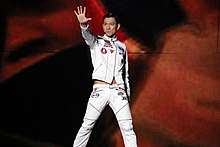Four Heavenly Kings (Hong Kong)

Jacky Cheung in 2007

Andy Lau in 2011

Aaron Kwok in 2002
.jpg)
Leon Lai in 2006
Four Heavenly Kings (四大天王) is a Chinese term created in June 1992 by Oriental Daily News to refer to the four biggest male entertainment/arts superstars in Hong Kong at that time: Jacky Cheung, Andy Lau, Aaron Kwok and Leon Lai.[1] Having successful singing (in both Cantopop and Mandopop) as well as acting careers well into the 2000s, they dominated the industry in Hong Kong and throughout the larger Chinese speaking world in the 1990s. Thus is the '90s is sometimes also called the "Four Heavenly Kings Era" in Hong Kong entertainment, as their songs swept the awards of Top 10 Songs of the Year during a 6-year span.[2]
The term is derived from Four Heavenly Kings, which originally is a reference to four gods in Buddhism.
The Four Heavenly Kings
- Jacky Cheung (b. 10/07/61)
- Andy Lau (b. 27/09/61)
- Aaron Kwok (b. 26/10/65)
- Leon Lai (b. 11/12/66)
Acting collaborations
| Film | ||||||
|---|---|---|---|---|---|---|
| Year | Film | Cheung | Lau | Kwok | Lai | Notes |
| 1988 | As Tears Go By | Hong Kong Film Award for Best Supporting Actor (Cheung) Nominated: Hong Kong Film Award for Best Actor (Lau) | ||||
| 1989 | Little Cop | |||||
| 1990 | Days of Being Wild | |||||
| 1991 | Saviour of the Soul | Nominated: Hong Kong Film Award for Best Supporting Actor (Kwok) | ||||
| Lee Rock II | ||||||
| The Banquet | ||||||
| 1992 | Gameboy Kids | |||||
| Gun n' Rose | ||||||
| With or Without You | ||||||
| The Wicked City | ||||||
| 1993 | Future Cops | |||||
| 1998 | Anna Magdalena | |||||
| 2003 | Infernal Affairs III | Golden Horse Award for Best Leading Actor (Lau) Chinese Film Media Awards for Outstanding Actor (Lau) Nominated: Golden Bauhinia Awards for Best Actor (Lau) | ||||
| Golden Chicken 2 | Golden Bauhinia Awards for Best Actor (Cheung) Golden Bauhinia Awards for Most Dedicated Actor (Cheung) Ming Pao Anniversary Award for Most Outstanding Actor (Cheung) Nominated: Hong Kong Film Award for Best Actor (Cheung) Nominated: Golden Horse Award for Best Leading Actor (Cheung) | |||||
| 2004 | Jiang Hu | |||||
| 2009 | The Founding of a Republic | |||||
| Bodyguards and Assassins | ||||||
| 2012 | Cold War | |||||
| 2016 | From Vegas to Macau III | |||||
| Television dramas | ||||||
| Year | Title | Cheung | Lau | Kwok | Lai | Notes |
| 1989 | Song Bird | |||||
References
This article is issued from
Wikipedia.
The text is licensed under Creative Commons - Attribution - Sharealike.
Additional terms may apply for the media files.